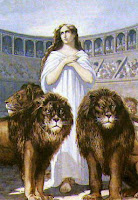Tuesday, April 14, 2015
Tertullian (extra credit)
Tertullian's Apology is a strong defense of the Christian faith, but it sometimes seems more than a bit provocative. Read Chapters 1 and 50 at the link here (and any chapters in between that appeal to you). What's your overall impression? Is this work more likely to make the Roman authorities think twice about torturing and executing Christians, or is it more likely to irritate them? Or does it do something of both? How would you have reacted to this work if you had been a Roman official directly or indirectly involved in the trials of Christians?
Justin Martyr (extra credit)
Justin Martyr's First Apology is an excellent example of the arguments Christian writers used to win over the hearts and minds of the people of the Roman empire. Skim through this work at the link here. Do you see here anything that seems to you especially likely to win support for Christianity, or at least to convince the philosophically-minded emperor to by sympathetic to Christians?
Athenagoras (extra credit)
Please skim through Athenagoras' Plea for the Christians. Like Justin, Athenagoras defends Christians against the incest and cannibalism slanders. He also uses pagan sources to point toward Christian truth. What do you see in this work that might have been especially helpful in drawing educated pagans toward Christianity, or at least in making them more tolerant of Christians?
Eusebius Book X
 Eusebius' final pages are among the most optimistic in all of historical literature. Why is Eusebius so positive and so hopeful about the future? In particular, why is he so positive about Constantine? What is Constantine doing that makes Eusebius feel that the Roman world is exactly on the right track? Do you feel Eusebius is missing anything here?
Eusebius' final pages are among the most optimistic in all of historical literature. Why is Eusebius so positive and so hopeful about the future? In particular, why is he so positive about Constantine? What is Constantine doing that makes Eusebius feel that the Roman world is exactly on the right track? Do you feel Eusebius is missing anything here?
Eusebius on Heretics and Heresy (Eusebius Book VII)
Monday, April 13, 2015
Eusebius Books IV and V (Persecution)
 Like any historian, Eusebius is only as good as his sources. When it comes to 2nd century persecutions, his sources are sometimes excellent (e.g., Justin Martyr) and sometimes not quite as reliable. Nevertheless, while one might question some of the details he includes, Eusebius is an excellent source for understanding the reasons Christians were persecuted and the reasons Christianity was able to grow despite the persecutions.
Like any historian, Eusebius is only as good as his sources. When it comes to 2nd century persecutions, his sources are sometimes excellent (e.g., Justin Martyr) and sometimes not quite as reliable. Nevertheless, while one might question some of the details he includes, Eusebius is an excellent source for understanding the reasons Christians were persecuted and the reasons Christianity was able to grow despite the persecutions.
Read through some of the martyrdom sections in Books IV and V of Eusebius' History of the Church. Sections you might find particularly useful are 4:14-17 (which includes an account of the martyrdom of Polycarp) and 5:1-3 (which includes the martyrdom of Blandina).
What do you find in these sections that helps explain Roman persecution of the Christians or helps explain the perseverance of the Christians despite the persecutions?
Wednesday, April 8, 2015
Deuterocanoncials (extra credit)
 Please read through a portion (one or two chapters is enough) of any of the Deuterocanonical books (the books included in Catholic and Greek Orthodox Bibles, but not ususally included in Protestant Bibles). I recommend especially Ecclesiasticus (Sirach), but the other books are worth looking at as well.
Please read through a portion (one or two chapters is enough) of any of the Deuterocanonical books (the books included in Catholic and Greek Orthodox Bibles, but not ususally included in Protestant Bibles). I recommend especially Ecclesiasticus (Sirach), but the other books are worth looking at as well.Note what you find particularly interesting in the selection you read. Would you ever read through the Deuterocanonicals on your own? Why, or why not?
If you have fallen behind on the blogs, you meet do additional entries on other Deuterocanonical books. [Please note: the link I give here has a pretty idiosyncratic list of the Apocrypha. "Bel and the Dragon" and "Susannah" are usually just called "additions to Daniel" and that's where you will find them in most Catholic Bibles.]
Subscribe to:
Comments (Atom)



